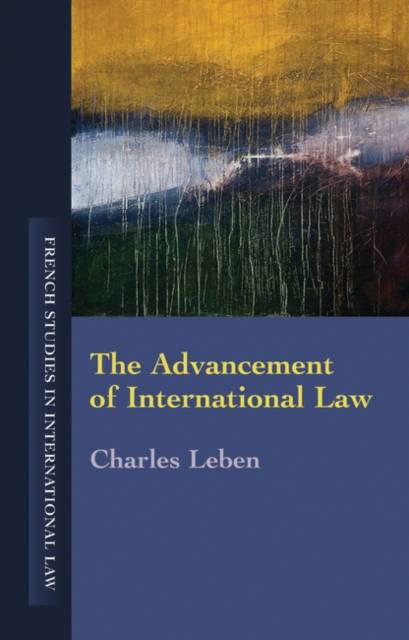
Bedankt voor het vertrouwen het afgelopen jaar! Om jou te bedanken bieden we GRATIS verzending (in België) aan op alles gedurende de hele maand januari.
- Afhalen na 1 uur in een winkel met voorraad
- In januari gratis thuislevering in België
- Ruim aanbod met 7 miljoen producten
Bedankt voor het vertrouwen het afgelopen jaar! Om jou te bedanken bieden we GRATIS verzending (in België) aan op alles gedurende de hele maand januari.
- Afhalen na 1 uur in een winkel met voorraad
- In januari gratis thuislevering in België
- Ruim aanbod met 7 miljoen producten
Zoeken
Omschrijving
Any talk of the advancement of international law presupposes that two objections are met. The first is the 'realist' objection which, observing the state of international relations today, claims that when it comes down to the important things in international life - war and peace, and more generally power politics among states - no real advancement has been made. International society remains a society of sovereign states deciding matters with regard solely to their own best interests and with international law all too often being no more than a thin cloak cast over the precept that 'might is right.' Against this excessive skepticism stands excessive optimism. International law is supposedly making giant strides forward, thanks especially to the tremendous mass of soft law generated by international organizations over the past 60 years and more. By incautiously mixing all manner of customs, treaties, resolutions, and recommendations, a picture of international law is painted that has little to do with the 'real world.' This book is arranged into three sections. The first section shows, from the specific example of international investment law, that the past half-century has seen the invention of two genuinely new techniques in positive law: state contracts and transnational arbitration without privity. This is 'advancement' in international law, not because the techniques are 'good' in themselves (one may well think them 'bad'), but because they have introduced legal possibilities into international law that did not exist heretofore. The second section examines the theoretical consequences of those new legal techniques and especially the way they affect the theory of the state. The third section widens the field of view and asks whether European law has surpassed international law in a move towards federalism or whether it represents a step forward for international law. These reflections make for a clearer theoretical understanding of what constitutes true advancement in international law. Such an understanding should give pause both to those who argue that hardly any progress has been made and to those who are overly fanciful about progress.
Specificaties
Betrokkenen
- Auteur(s):
- Uitgeverij:
Inhoud
- Aantal bladzijden:
- 339
- Taal:
- Engels
- Reeks:
- Reeksnummer:
- nr. 3
Eigenschappen
- Productcode (EAN):
- 9781841132785
- Verschijningsdatum:
- 15/10/2010
- Uitvoering:
- Hardcover
- Formaat:
- Ongenaaid / garenloos gebonden
- Afmetingen:
- 142 mm x 216 mm
- Gewicht:
- 566 g

Alleen bij Standaard Boekhandel
+ 407 punten op je klantenkaart van Standaard Boekhandel
Beoordelingen
We publiceren alleen reviews die voldoen aan de voorwaarden voor reviews. Bekijk onze voorwaarden voor reviews.









